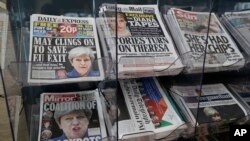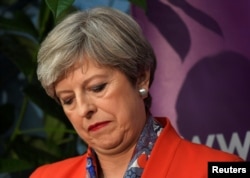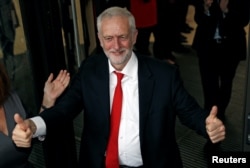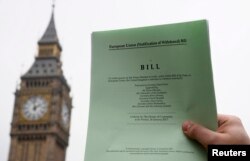The Great British public has spoken. But as journalist Ian Hislop quipped Friday on a television comedy show, “no one knows what they said.”
Hardly had the votes been counted in Britain’s indecisive election, in which no party got an outright parliamentary majority, than politicians took to airwaves and tapped away on Twitter to spin what the result meant.
And crucially they debated whether the voters had rejected Brexit — or at least Prime Minister Theresa May’s hard version of a break with the European Union, which would see Britain not only relinquish EU membership but leave the single market and the bloc’s customs union.
Impact on Brexit talks
Brexit talks with EU negotiators are scheduled to begin in 10 days. EU officials have warned talks shouldn’t be delayed and have expressed their fear that with the government weakened by the election result the talks could become even more complicated.
“This election is a rejection of May and hard Brexit,” tweeted Alastair Campbell, a onetime adviser to former Labour Prime Minister Tony Blair. “The mandate Theresa May sought for her extreme version of Brexit has been rejected,” Liberal Democrat leader Tim Farron told cheering supporters in a speech Friday.
John Redwood, a senior Conservative, disputes the claim, arguing the result did not mean there should be any softening in a hard divorce from Europe, noting that Labour, the second largest party, also endorsed Brexit in its election manifesto. “I think [Theresa May] set out a very good case on what we now need to do immediately on Brexit and I think it makes a lot of sense because the country by a very overwhelming majority voted for the two main parties that both want to complete Brexit,” he said.
He argued if voters had wanted to reverse the result of last June’s Brexit referendum, they would have voted for Liberal Democrat, who called for a second referendum. “The public said no thanks, we don’t want a second referendum on Europe, we don’t want to stay in Europe, we want you to do a good deal.” The Liberal Democrats won 12 seats in the election.
But Redwood’s argument strikes some as disingenuous. May focused her campaign on the break with Europe, saying she had called the snap election to seek a mandate for her hard Brexit plan. The voters didn’t give it to her — almost 60 percent of those who voted Thursday rejected the Conservatives.
With May severely weakened and forced to govern as head of a minority government, Britain’s position on Brexit has suddenly become much murkier, and it isn't clear the embattled Prime Minister has the political strength, let alone the public backing, to force through her original hard Brexit vision.
Softer Brexit
Public sentiment would appear from the election result to favor a much softer Brexit, argue analysts.
While Labour endorsed in its manifesto a break with Europe and even leaving the Single Market, a position it adopted to help cut immigration numbers, the party’s leaders left considerable wiggle room and talked about renegotiating the rules of Single Market membership to allow some curtailing of Europeans migrating to Britain.
Labour’s dramatically improved performance in the election was due in large part to a surge in young voters backing it, many of whom voted for the party partly because they saw it as the best vehicle to soften Brexit and derail May’s plan for a sharp break with the EU. In pro-EU London, the Tories suffered a tremendous electoral reversal and weren’t able to challenge Labour in marginal seats.
Without doubt voters rejected a hard Brexit, argues Ian Dunt, the editor of the news-site politics.co.uk. “The turnout was higher in Remain areas. The swell in Labour support in the cities plainly had some connection to Brexit. And youth turnout was key. Young people voted hard for Remain,” he argued.
Aside from what the voters Thursday meant when it came Brexit, May also has a more immediate challenge facing her when it comes to a hard Brexit. A diminished May, who is already facing calls to resign, has less parliamentary room for maneuver within her own party. Those Conservative lawmakers, such as Ruth Davidson, the leader of the Scottish Conservatives, a rising political star, who favor a softer Brexit will have to be placated.
Davidson on Friday quickly made it clear that May needs to heed the voice of the soft Brexiters, urging her to adopt a “consensual” approach.
At the same time, May has to be wary of the hard Brexiters in the party. In a sign that May understands the danger of slamming the door on either wing, she has let her two top aides go, accepting the resignations Saturday of Nick Timothy and Fiona Hill, who have been inseparable from her the past 10 years. The pair were known as “May’s Rottweilers.” Both wings of the party blame them for the election debacle.
Further, May will rely for a working majority in the House of Commons on ten pro-Brexit lawmakers from Northern Ireland’s Democratic Unionist Party. But they, too, advocate a soft Brexit, partly in order to keep the border with the Republic of Ireland open to facilitate free trade between the two parts of the island of Ireland.
Agreeing a position with the DUP is going to be “very difficult for May,” argues Bronwen Maddox, the director of the Institute for Government, a think tank.







